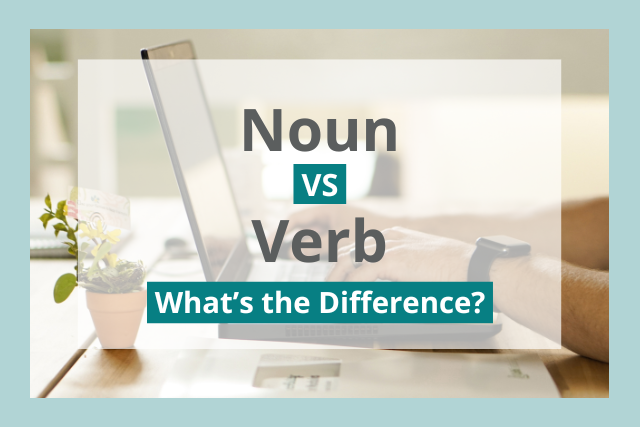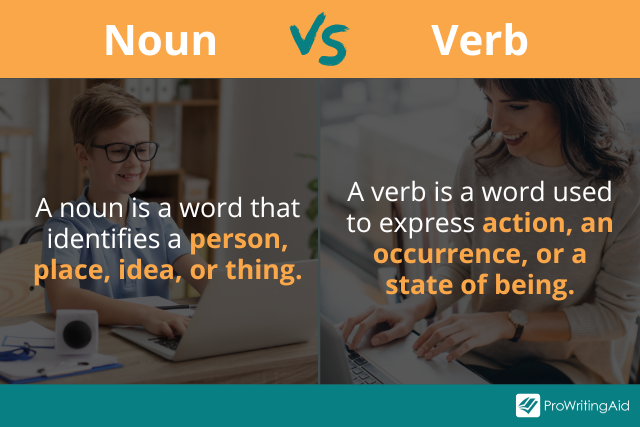
The two most common word types in the English language are nouns and verbs. This is because every sentence must include a verb and a noun in order to be complete.
But, what is the difference between a noun and a verb?
A noun is a word used to identify a person, place, or thing. A verb is a word used to describe an action or state.
Learn more about the difference between nouns and verbs in this article, plus see some examples of them in sentences.
Noun Definition and Meaning
A noun is a word that identifies a person, place, idea, or thing. For example, hobbits, ring, Frodo, the Shire, and Sting are all nouns.
There are two main types of nouns: common nouns and proper nouns. These nouns can then be concrete or abstract, plural or singular, and countable or uncountable. Let’s look at these noun types in more detail.
Common Nouns vs Proper Nouns
Common nouns are words for types of things, such as pet, pet store, and treats. Proper nouns are words for specific things with names, such as Alice, Wonderland, and the Cheshire Cat.
Concrete Nouns vs Abstract Nouns
Concrete nouns refer to a material object, such as dog, red roses, and lead. Abstract nouns refer to ideas, qualities, and concepts, such as love, bravery, and curiosity.
Singular Nouns vs Plural Nouns
Singular nouns are those that refer to only one person, place, thing, or idea, such as rabbit, the Vorpal Sword, and the White Queen. Plural nouns are those that refer to multiple people, things, ideas, or places. For example, hedgehogs, teacups, and cakes.
Some nouns can be both singular or plural, depending on the context, such as sheep and food.
Countable Nouns vs Uncountable Nouns
The final category of nouns is countable vs uncountable nouns. Countable nouns are things we can count with numbers, such as mushrooms, playing cards, and pocket watches. Uncountable nouns are things we cannot count with numbers, such as croquet, fear, and time.

Verb Definition and Meaning
A verb is a word used to express action, an occurrence, or a state of being. For example, run, dancing, and drank are all verbs.
There are three main types of verbs: linking verbs, helping verbs, and action verbs. These verbs can then be transitive or intransitive, and regular or irregular. Let’s look at the three primary verb types first.
Linking Verbs
Linking verbs tell us what the subject of a sentence is, not what they are doing. Some linking verb examples are should, were, and seeming.
Helping Verbs
Helping verbs, also known as auxiliary verbs, add detail to the main verb of the sentence. The most common helping verbs are to be, to do, and to have.
The main difference between a helping verb and a linking verb is that linking verbs are the main verb of the sentence, and helping verbs are not.
Action Verbs
The last type of verb, action verbs, convey an action. Some action verb examples are walking, perform, and increased.
Transative Verbs vs Intransitive Verbs
Each of these verbs is then either transitive or intransitive. Transitive verbs require an object to express a thought, and intransitive verbs do not require an object.
Some verbs can be either transitive or intransitive, depending on the context, such as walked.
- Transitive: I walked the dog in the rain before work today.
- Intransitive: Barbara slowly walked away.
Regular Verbs vs Irregular Verbs
Finally, every verb is either regular or irregular. If you can add –d or –ed to the end of the word to form the simple past tense, it is a regular verb. If you cannot, it is an irregular verb. Walk, arrive, and marry are regular verbs, while go, put, and win are irregular verbs.
Noun vs Verb Example Sentences
Every complete sentence contains both a noun and a verb. In the following examples, the nouns are in bold, and the verbs are in italics.
- English grammar is difficult to learn.
- You should always try to include the five senses in your poems.
- I had to make a speech at school today because I am the head girl.
- I will send an email to Milo after completing this task.
- For me, the most important part of Christmas is seeing my extended family.
If a sentence doesn’t contain both a noun and a verb, it is called a sentence fragment. Sentence fragments cause your writing to sound choppy, incomplete, and unclear. ProWritingAid’s grammar checker can detect sneaky sentence fragments and help you correct them.

